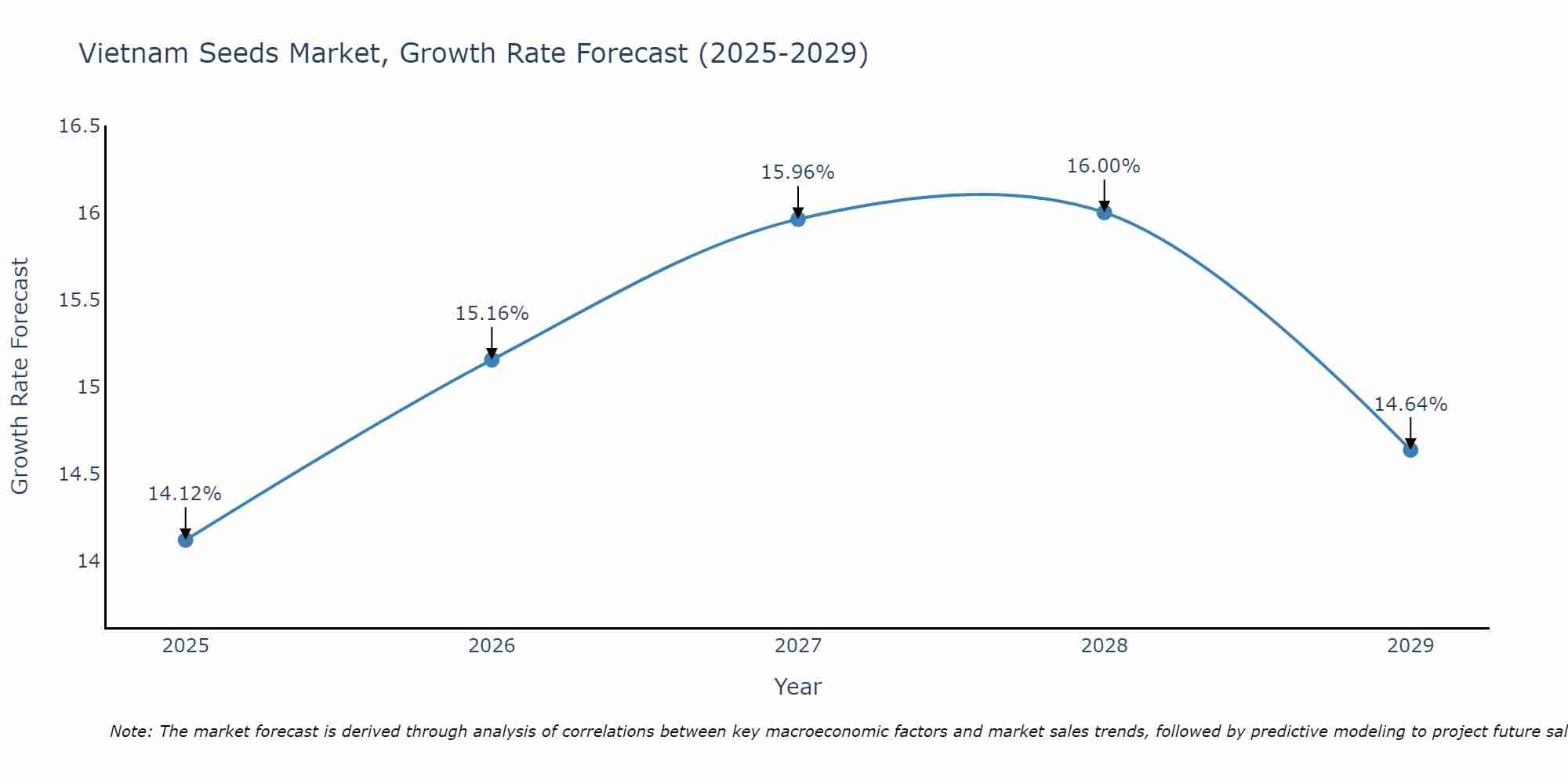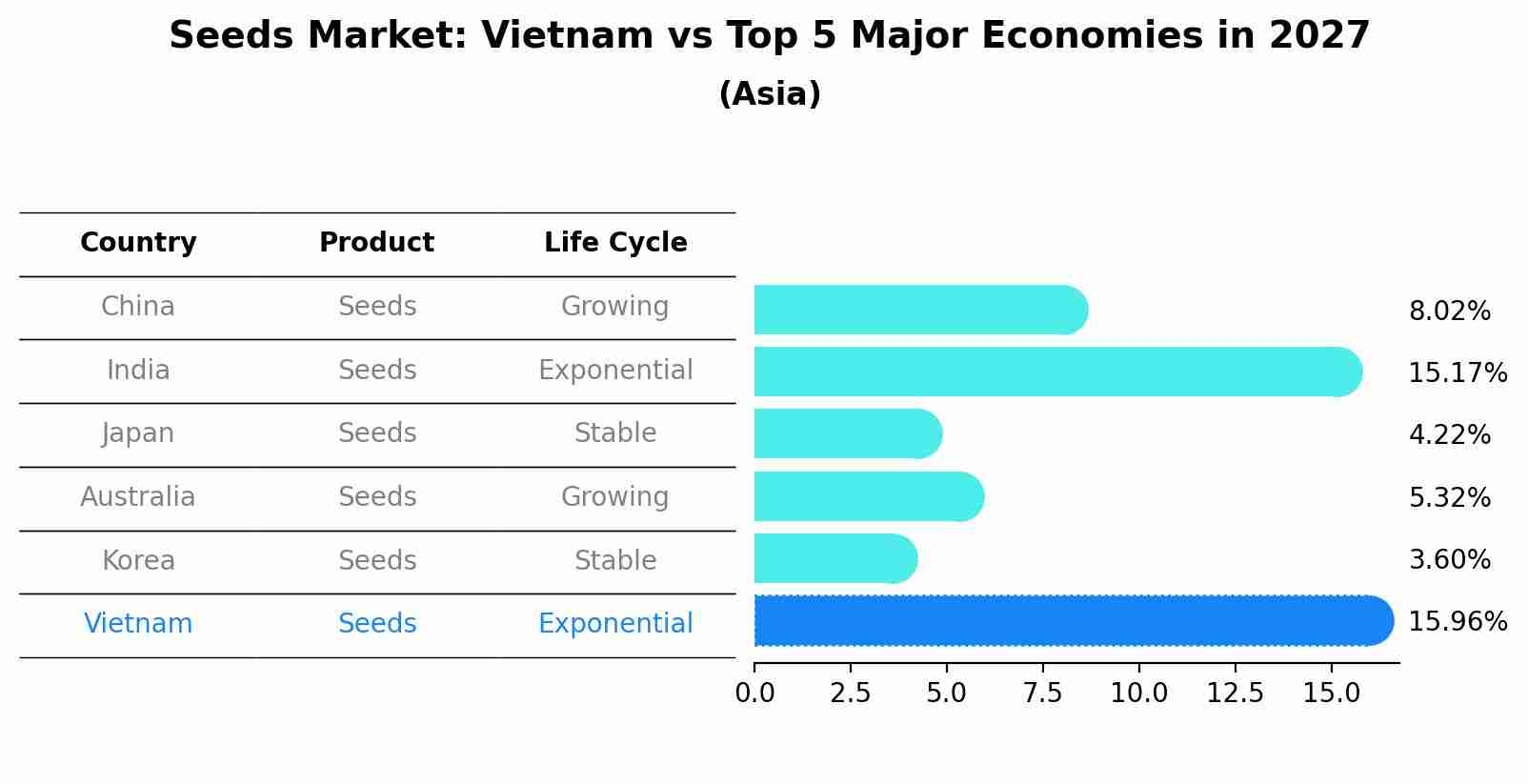Vietnam Seeds Market (2025-2031) Outlook | Forecast, Revenue, Value, Companies, Share, Size, Industry, Trends, Growth, Analysis
| Product Code: ETC384690 | Publication Date: Aug 2022 | Updated Date: Apr 2025 | Product Type: Market Research Report | |
| Publisher: 6Wresearch | Author: Ravi Bhandari | No. of Pages: 75 | No. of Figures: 35 | No. of Tables: 20 |
Vietnam Seeds Market Size Growth Rate
The Vietnam Seeds Market is projected to witness mixed growth rate patterns during 2025 to 2029. Growth accelerates to 16.00% in 2028, following an initial rate of 14.12%, before easing to 14.64% at the end of the period.

Seeds Market: Vietnam vs Top 5 Major Economies in 2027 (Asia)
In the Asia region, the Seeds market in Vietnam is projected to expand at a exponential growth rate of 15.96% by 2027. The largest economy is China, followed by India, Japan, Australia and South Korea.

Vietnam Seeds Market Synopsis
The Vietnam seeds market is a pivotal part of the country`s agriculture sector, ensuring the availability of quality seeds for crop production. It encompasses a wide range of seeds, including those for rice, corn, vegetables, and fruits. Improved seed varieties and technologies are essential to enhancing crop yields and food security. The market has seen investments in research and development, promoting hybrid and genetically modified seeds to address agricultural challenges. As Vietnam seeks to modernize its agriculture and increase productivity, the seeds market will play a vital role in shaping the sector`s future.
Drivers of the Market
The seeds market in Vietnam is driven by the modernization of agriculture and the adoption of hybrid and genetically modified (GM) seeds. Farmers are increasingly seeking high-yielding and disease-resistant seed varieties to enhance crop productivity. Government initiatives and investments in research and development for seed technology have also propelled the growth of this market.
Challenges of the Market
The Vietnam seeds market faces challenges related to the availability and quality of seeds. Ensuring that farmers have access to high-quality seeds, including hybrid and genetically improved varieties, can be critical for crop productivity. However, there may be issues with counterfeit or low-quality seeds in the market, impacting farm yields and profitability. Additionally, addressing concerns about seed pricing and affordability for small-scale farmers is essential for equitable access. Regulatory compliance and intellectual property protection for seed varieties can add complexity to the market. The market may also face challenges related to changing climate conditions and pest pressures, which can affect seed viability and performance. Lastly, promoting modern agricultural practices and educating farmers about the benefits of improved seeds are important for market growth.
COVID-19 Impact on the Market
The seeds market experienced disruptions in the supply chain, affecting both crop and vegetable seeds. Farmers faced challenges in accessing quality seeds for planting, which impacted crop yields. Seed companies worked to adapt to these challenges by enhancing distribution networks and ensuring the availability of essential seeds.
Key Players in the Market
Leading companies in the Vietnam seeds market include PAN Group and Hoang Anh Gia Lai Agricultural Joint Stock Company. They offer a wide range of seeds, including rice, corn, and vegetable varieties, catering to the diverse needs of Vietnamese farmers.
Key Highlights of the Report:
- Vietnam Seeds Market Outlook
- Market Size of Vietnam Seeds Market, 2024
- Forecast of Vietnam Seeds Market, 2031
- Historical Data and Forecast of Vietnam Seeds Revenues & Volume for the Period 2021-2031
- Vietnam Seeds Market Trend Evolution
- Vietnam Seeds Market Drivers and Challenges
- Vietnam Seeds Price Trends
- Vietnam Seeds Porter's Five Forces
- Vietnam Seeds Industry Life Cycle
- Historical Data and Forecast of Vietnam Seeds Market Revenues & Volume By Type for the Period 2021-2031
- Historical Data and Forecast of Vietnam Seeds Market Revenues & Volume By Genetically Modified (GM) Seed for the Period 2021-2031
- Historical Data and Forecast of Vietnam Seeds Market Revenues & Volume By Conventional Seed for the Period 2021-2031
- Historical Data and Forecast of Vietnam Seeds Market Revenues & Volume By Crop for the Period 2021-2031
- Historical Data and Forecast of Vietnam Seeds Market Revenues & Volume By Field Crops for the Period 2021-2031
- Historical Data and Forecast of Vietnam Seeds Market Revenues & Volume By Fruit & Vegetable Crops for the Period 2021-2031
- Historical Data and Forecast of Vietnam Seeds Market Revenues & Volume By Availability for the Period 2021-2031
- Historical Data and Forecast of Vietnam Seeds Market Revenues & Volume By Commercial Seeds for the Period 2021-2031
- Historical Data and Forecast of Vietnam Seeds Market Revenues & Volume By Saved Seeds for the Period 2021-2031
- Historical Data and Forecast of Vietnam Seeds Market Revenues & Volume By Seed Treatment for the Period 2021-2031
- Historical Data and Forecast of Vietnam Seeds Market Revenues & Volume By Treated for the Period 2021-2031
- Historical Data and Forecast of Vietnam Seeds Market Revenues & Volume By Untreated for the Period 2021-2031
- Historical Data and Forecast of Vietnam Seeds Market Revenues & Volume By Seed Trait for the Period 2021-2031
- Historical Data and Forecast of Vietnam Seeds Market Revenues & Volume By Herbicide Tolerant for the Period 2021-2031
- Historical Data and Forecast of Vietnam Seeds Market Revenues & Volume By Insecticide Resistant for the Period 2021-2031
- Historical Data and Forecast of Vietnam Seeds Market Revenues & Volume By Other Stacked Traits for the Period 2021-2031
- Vietnam Seeds Import Export Trade Statistics
- Market Opportunity Assessment By Type
- Market Opportunity Assessment By Crop
- Market Opportunity Assessment By Availability
- Market Opportunity Assessment By Seed Treatment
- Market Opportunity Assessment By Seed Trait
- Vietnam Seeds Top Companies Market Share
- Vietnam Seeds Competitive Benchmarking By Technical and Operational Parameters
- Vietnam Seeds Company Profiles
- Vietnam Seeds Key Strategic Recommendations
Frequently Asked Questions About the Market Study (FAQs):
- Single User License$ 1,995
- Department License$ 2,400
- Site License$ 3,120
- Global License$ 3,795
Search
Thought Leadership and Analyst Meet
Our Clients
Related Reports
- Canada Oil and Gas Market (2026-2032) | Share, Segmentation, Value, Industry, Trends, Forecast, Analysis, Size & Revenue, Growth, Competitive Landscape, Outlook, Companies
- Germany Breakfast Food Market (2026-2032) | Industry, Share, Growth, Size, Companies, Value, Analysis, Revenue, Trends, Forecast & Outlook
- Australia Briquette Market (2025-2031) | Growth, Size, Revenue, Forecast, Analysis, Trends, Value, Share, Industry & Companies
- Vietnam System Integrator Market (2025-2031) | Size, Companies, Analysis, Industry, Value, Forecast, Growth, Trends, Revenue & Share
- ASEAN and Thailand Brain Health Supplements Market (2025-2031) | Strategy, Consumer Insights, Analysis, Investment Trends, Opportunities, Growth, Size, Share, Industry, Revenue, Segments, Value, Segmentation, Supply, Forecast, Restraints, Outlook, Competition, Drivers, Trends, Demand, Pricing Analysis, Competitive, Strategic Insights, Companies, Challenges
- ASEAN Bearings Market (2025-2031) | Strategy, Consumer Insights, Analysis, Investment Trends, Opportunities, Growth, Size, Share, Industry, Revenue, Segments, Value, Segmentation, Supply, Forecast, Restraints, Outlook, Competition, Drivers, Trends, Demand, Pricing Analysis, Competitive, Strategic Insights, Companies, Challenges
- Europe Flooring Market (2025-2031) | Outlook, Share, Industry, Trends, Forecast, Companies, Revenue, Size, Analysis, Growth & Value
- Saudi Arabia Manlift Market (2025-2031) | Outlook, Size, Growth, Trends, Companies, Industry, Revenue, Value, Share, Forecast & Analysis
- Uganda Excavator, Crane, and Wheel Loaders Market (2025-2031) | Strategy, Consumer Insights, Analysis, Investment Trends, Opportunities, Growth, Size, Share, Industry, Revenue, Segments, Value, Segmentation, Supply, Forecast, Restraints, Outlook, Competition, Drivers, Trends, Demand, Pricing Analysis, Competitive, Strategic Insights, Companies, Challenges
- Rwanda Excavator, Crane, and Wheel Loaders Market (2025-2031) | Strategy, Consumer Insights, Analysis, Investment Trends, Opportunities, Growth, Size, Share, Industry, Revenue, Segments, Value, Segmentation, Supply, Forecast, Restraints, Outlook, Competition, Drivers, Trends, Demand, Pricing Analysis, Competitive, Strategic Insights, Companies, Challenges
Industry Events and Analyst Meet
Whitepaper
- Middle East & Africa Commercial Security Market Click here to view more.
- Middle East & Africa Fire Safety Systems & Equipment Market Click here to view more.
- GCC Drone Market Click here to view more.
- Middle East Lighting Fixture Market Click here to view more.
- GCC Physical & Perimeter Security Market Click here to view more.
6WResearch In News
- Doha a strategic location for EV manufacturing hub: IPA Qatar
- Demand for luxury TVs surging in the GCC, says Samsung
- Empowering Growth: The Thriving Journey of Bangladesh’s Cable Industry
- Demand for luxury TVs surging in the GCC, says Samsung
- Video call with a traditional healer? Once unthinkable, it’s now common in South Africa
- Intelligent Buildings To Smooth GCC’s Path To Net Zero


















